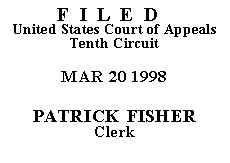

| BENTON G. MOORE,
Plaintiff-Appellant, v. KENNETH S. APFEL, Commissioner, Social Security Administration,(*) Defendant-Appellee. |
|
Claimant Benton G. Moore appeals the district court's order(1) affirming the Commissioner's decision to deny his application for social security disability benefits. The Commissioner determined that Mr. Moore could perform sedentary work available in significant numbers in the local and national economies and, therefore, he is not disabled within the meaning of the Social Security Act. Mr. Moore contends that the Commissioner (1) failed to recognize that his skin condition significantly limits his ability to work, (2) improperly applied the medical-vocational guidelines (the grids), and (3) applied the incorrect legal standards. We affirm.
We review the Commissioner's decision to determine whether it is supported by substantial evidence and whether correct legal standards were applied. See Hawkins v. Chater, 113 F.3d 1162, 1164 (10th Cir. 1997). Substantial evidence is "'such relevant evidence as a reasonable mind might accept as adequate to support a conclusion.'" Soliz v. Chater, 82 F.3d 373, 375 (10th Cir. 1996) (quoting Richardson v. Perales, 402 U.S. 389, 401 (1971) (further quotation omitted)). We may neither reweigh the evidence nor substitute our judgment for that of the Commissioner. See Casias v. Secretary of Health & Human Servs., 933 F.2d 799, 800 (10th Cir. 1991).
We have carefully reviewed the record on appeal, as well as the briefs submitted by the parties. Applying the standards set out above, we affirm the denial of benefits for substantially the reasons stated in the magistrate judge's March 10, 1997 recommendation, as adopted by the district court.
The judgment of the United States District Court for the Eastern District of Oklahoma is AFFIRMED.
Entered for the Court
Circuit Judge
*. Pursuant to Fed. R. App. P. 43(c), Kenneth S. Apfel is substituted for John J. Callahan, former Acting Commissioner of Social Security, as the defendant in this action.
**. This order and judgment is not binding precedent, except under the doctrines of law of the case, res judicata, and collateral estoppel. The court generally disfavors the citation of orders and judgments; nevertheless, an order and judgment may be cited under the terms and conditions of 10th Cir. R. 36.3.
1. The parties consented to proceed before a magistrate judge. See 28 U.S.C. § 636(c).